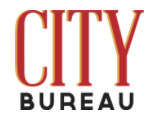On June 30, 2017, the Fraternal Order of Police contract with the city of Chicago will expire pending negotiations for a new agreement. Using a team of City Bureau Documenters, an excel spreadsheet and Rap Genius, we've annotated the police union contract with analysis, media reports, legal cases/studies, academic research and more to present a complete view on how the Fraternal Order of Police impacts, affects and influences police accountability nationwide.
We broke the Chicago police union contract down according to six criteria:
- "In Plain English": The contract in plain, non-legalese language.
- "What’s the Impact?": How the contract affects existing conditions, i.e. both sides of the story.
- "Enabling Legislation": State collective bargaining laws, civil service statutes, open record acts and other police protection laws that intersect with the contract.
- "What Would it Take to Change This?": If a change were to be made by the city or FOP, what would stand in the way.
- "When Was This Introduced?": The first time any annotated line first appeared in Chicago FOP contracts since 1981.
- "Further Reading": Additional links, articles and text for further study.
Use "The Annotated Tracker" to see the verbatim text from the police union contract along with annotations from City Bureau reporters and Documenters, use the "National Comparison Chart" to see which contract provisions are allowed in five major cities, use the "Police Union Timeline" to sift through an interactive history of police union negotiations and central events, and the "Research" tab to explore the articles, legal cases, reports and analysis that went into the making of this public tool.
How to use the Tracker:
1) Sign up or sign in to Genius (creating an account takes a minute or less).
2) Highlight any text on the #FOPtracker to add your own annotations—no download required.
3) Click on the yellow highlighted text in "The Annotated Tracker" tab to see annotations based on media reports, legal precedents, interviews, research studies and analysis from City Bureau Documenters.
Our Process
Using an excel sheet and Genius, a team of City Bureau Community Documenters has created an annotated, updated and independent hub for public use that will provide analysis and context around the Fraternal Order of Police contract with the city of Chicago. City Bureau Documenters spent several weeks annotating the police union contract text before opening the tool to public input in May 2017.
Although care has been taken to ensure the accuracy, completeness and reliability of the information provided, City Bureau assumes no responsibility after publication. All readers are allowed (and encouraged) to post their own annotations. Reader submitted annotations are read by City Bureau but not moderated for content.
Click here to explore all of our annotated Trackers.
Have a question, comment or suggestion? Interested in having us host a Tracker workshop in your education space? Contact us at info@citybureau.org, on Facebook: /CityBureau and on Twitter: @citybureau.
DOCUMENTERS
Jose Abonce
Timna Axel
Chelsea Berry
Jeremy Borden
Eleanore Catolico
Alex Hernandez
Reuben Unrau
PROJECT MANAGERS
ADESHINA EMMANUEL
DARRYL HOLLIDAY
City Bureau Documenters are a critical component of our mission to bridge the ideals of civic journalism with the economic and political realities in which it exists. For more information, and to join our paid Documenters program, simply fill out this brief application.
contributors
City Bureau is a nonprofit civic journalism lab based on the South Side of chicago. We bring journalists and communities together in a collaborative spirit to produce responsible media coverage and encourage civic participation.
In These Times, an independent, nonprofit magazine, is dedicated to advancing democracy and economic justice, informing movements for a more humane world, and providing an accessible forum for debate about the policies that shape our future.
The Invisible Institute is a journalistic production company on the South Side of Chicago. Their mission is to enhance the capacity of citizens to hold public institutions accountable.
Injustice Watch is a non-partisan, not-for-profit, multimedia journalism organization that conducts in-depth research exposing institutional failures that obstruct justice and equality.








